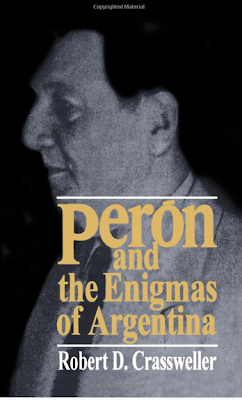[from Robert D. Crassweller's Perón and the Enigmas of Argentina, Norton, 1987]
. . . it was inevitable that Peronist Argentina and the United States would find friendship and understanding elusive. Of all the countries that shared the western and Christian traditions, these two were about as far apart as possible in their basic philosophies of government and society. In contrast to the ideal of the Mediterranean organic community, the ideal in the United States was a community maintained by the tension of opposing interests in more or less perpetual but changing conflict that was mediated by compromise, restraint, common sense, and the rule of law as imposed by a deliberately weak government. The heritage was not classical Mediterranean but Anglo-Saxon, and many of its great events such as Magna Carta and the Glorious Revolution were celebrations not of power but of the striking down of power. Peronist Argentina believed that freedom was attained through the exercise of central authority; the United States believed that freedom had to be maintained through opposition to central authority. As Samuel Huntington put it, "The central – and the oldest – theme of the American political tradition is opposition to concentrated power. The revolutionaries of 1776 opposed monarchical power and defined the issue as liberty against power . . . The deeply rooted suspicion of power has been shared by radicals and reactionaries, liberals and conservatives. The extent of this hostility is a distinguishing characteristic of American political culture compared with that of other societies." As if to confirm this view, the Department of State's Secret Policy Statement of March 1950 listed "current interpretations of the function of the state" as one of four sources of basic conflict between Argentina and the United States."
Perón would have replied with one of his classic statements of belief from Orientación política: "In my opinion, the world of the future will live in keeping with rules of democracy and respect for individual liberty. Now, the concepts of liberty and democracy are undergoing a rapid evolution. Liberty will be less and less the right of any one to do as he pleases, and will be more and more the obligation to do what is profitable for the community . . . woe to the peoples that . . . persist in establishing an incompatibility between the powers of the State and the ideals of liberty and democracy."
[Blogger proposes that the reader ponder Perón's warning in light of the powers of the USA State today]
